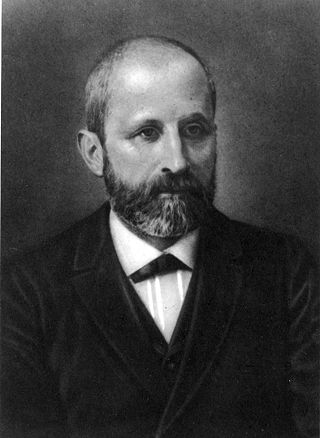
Johannes Friedrich Miescher was a Swiss physician and biologist. He was the first scientist to isolate nucleic acid in 1869. Miescher also identified protamine and made several other discoveries.

The University of Basel is a public research university in Basel, Switzerland. Founded on 4 April 1460, it is Switzerland's oldest university and among the world's oldest surviving universities. The university is traditionally counted among the leading institutions of higher learning in the country.

The SIB Swiss Institute of Bioinformatics is an academic not-for-profit foundation which federates bioinformatics activities throughout Switzerland.

The mammalian target of rapamycin (mTOR), also referred to as the mechanistic target of rapamycin, and sometimes called FK506-binding protein 12-rapamycin-associated protein 1 (FRAP1), is a kinase that in humans is encoded by the MTOR gene. mTOR is a member of the phosphatidylinositol 3-kinase-related kinase family of protein kinases.
The Basel Institute for Immunology (BII) was founded in 1969 as a basic research institute in immunology located at 487 Grenzacherstrasse, Basel, Switzerland on the Rhine River down the street from the main Hoffmann-La Roche campus near the Swiss-German border. The institute opened its doors in 1971.
A protein kinase inhibitor (PKI) is a type of enzyme inhibitor that blocks the action of one or more protein kinases. Protein kinases are enzymes that phosphorylate (add a phosphate, or PO4, group) to a protein and can modulate its function.

Science and technology in Switzerland play an important role in the Swiss economy, which has very few natural resources that are available in the country. The Swiss National Science Foundation, mandated by the Federal government, is the most important institute for promoting scientific research.
Brian Arthur Hemmings FRS is a British biochemist, and Senior Group Leader, at the Friedrich Miescher Institute for Biomedical Research. He is a member of the Faculty of 1000.

mTOR inhibitors are a class of drugs used to treat several human diseases, including cancer, autoimmune diseases, and neurodegeneration. They function by inhibiting the mammalian target of rapamycin (mTOR), which is a serine/threonine-specific protein kinase that belongs to the family of phosphatidylinositol-3 kinase (PI3K) related kinases (PIKKs). mTOR regulates cellular metabolism, growth, and proliferation by forming and signaling through two protein complexes, mTORC1 and mTORC2. The most established mTOR inhibitors are so-called rapalogs, which have shown tumor responses in clinical trials against various tumor types.

Silvia Arber is a Swiss neurobiologist. She teaches and researches at both the Biozentrum of the University of Basel and the Friedrich Miescher Institute for Biomedical Research in Basel Switzerland.
Barbara HohnForMemRS is an Austrian molecular biologist, particularly known for her research into the Agrobacterium tumefaciens.

Michael Nip Hall is an American-Swiss molecular biologist and professor at the Biozentrum of the University of Basel, Switzerland. He discovered TOR, a protein central for regulating cell growth.

Jean Pieters is a Dutch biochemist and Professor at the Biozentrum of the University of Basel, Switzerland.
Susan M. Gasser is a Swiss molecular biologist. From 2004 to 2019 she was the director of the Friedrich Miescher Institute for Biomedical Research in Basel, Switzerland, where she also led a research group from 2004 until 2021. She was in parallel professor of molecular biology at the University of Basel until April 2021. Since January 2021, Susan Gasser is director of the ISREC Foundation, which supports translational cancer research. She is also professor invité at the University of Lausanne in the department of fundamental microbiology. She is an expert in quantitative biology and studies epigenetic inheritance and genome stability. Recipient of multiple swiss and European awards, she was named member of the US Academy of Sciences in 2022.
Ruth Chiquet-Ehrismann was a Swiss biochemist and cell biologist working on interactions in the extracellular matrix.

Isabelle M. Mansuy is a professor in neuroepigenetics in the Medical Faculty of the University of Zurich and the Department of Health Science and Technology of the Swiss Federal Institute of Technology Zurich. She is known for her work on the mechanisms of epigenetic inheritance in relation to childhood trauma.

Dirk Schübeler is a German researcher, Director of the Friedrich Miescher Institute for Biomedical Research (FMI) and professor at the University of Basel. He is an expert in gene regulation.

Collin Yvès Ewald is a Swiss scientist investigating the molecular mechanisms of healthy aging. He is a molecular biologist and a professor at ETH Zurich, where he leads the Laboratory of Extracellular Matrix Regeneration. His research focuses on the remodeling of the extracellular matrix during aging and upon longevity interventions.

Nicolas H. Thomä is a German researcher, full professor at the EPFL School of Life Sciences and Director of the Paternot Chair for Cancer Research in Lausanne, Switzerland. He is a biochemist and structural biologist and a leading researcher in the fields of ubiquitin ligase biology and DNA repair.

Prisca Liberali is an Italian chemist who is a senior group leader at the Friedrich Miescher Institute for Biomedical Research. Her research takes a systems biology approach to understand the behaviour of multi-cellular systems. She was awarded the EMBO Gold Medal and EMBO Membership in 2022.














